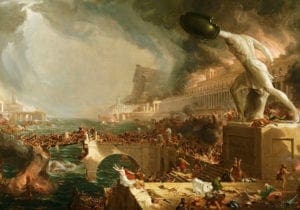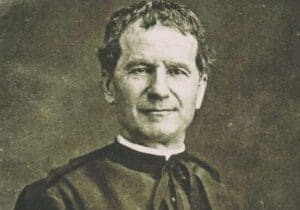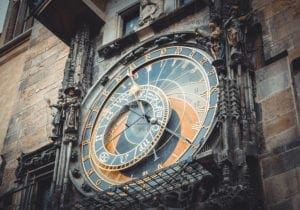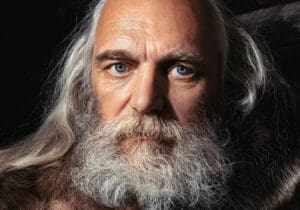
Tutto ciò che è passato non esiste più, ma in qualche modo è rimasto dentro di noi indipendentemente da quanto questo possa essere piacevole o meno.
Non può essere dimenticato o cambiato e l’unica cosa che possiamo fare è accettarlo senza rimpianti e guardare avanti cercando di trarne insegnamento per il presente e il futuro.
Qui di seguito una serie delle più belle frasi sul passato (in inglese e italiano) per riflettere sulla sua importanza nell’affrontare le nostre scelte. Eccole!
Aforismi, citazioni e frasi sul passato in inglese (con traduzione)
- What’s past is prologue.
Ciò che è passato è un prologo.
(William Shakespeare) - Life can only be understood backwards, but it must be lived forwards.
La vita può essere capita solo all’indietro, ma va vissuta in avanti.
(Søren Kierkegaard) 
- The future torments us, the past holds us back; this is why the present escapes us.
Il futuro ci tormenta, il passato ci trattiene. È per questo che il presente ci sfugge.
(Gustave Flaubert) - The future is a door, the past is the key.
Il futuro è una porta, il passato ne è la chiave.
(Victor Hugo) - Think only of the past as its remembrance gives you pleasure.
Pensa al passato soltanto quando il ricordarlo ti può dare piacere.
(Jane Austen) 
- I am not interested in the past. I am interested in the future, for that is where I expect to spend the rest of my life.
Non mi interessa il passato. Sono interessato al futuro, perché è lì che mi aspetto di trascorrere il resto della mia vita.
(Charles F. Kettering) - My past is everything I failed to be.
Il mio passato è tutto ciò che non sono riuscito a essere.
(Fernando Pessoa) - Our scars make us know that our past was for real.
Le nostre cicatrici ci ricordano che il passato è reale.
(Jane Austen) 
- Those who do not remember the past are condemned to repeat it.
Coloro che non ricordano il passato sono condannati a ripeterlo.
(George Santayana) - Rejoice in the things that are present; all else is beyond thee.
Rallegrati delle cose che sono presenti; tutto il resto è al di là di te.
(Michel de Montaigne) - Study the past if you would define the future.
Studia il passato se vuoi prevedere il futuro.
(Confucio) 
- Waste not fresh tears over old griefs.
Non sprecare lacrime fresche per vecchi dolori.
(Euripide) - No matter how hard the past is, you can always begin again.
Non importa quanto duro sia stato il passato, puoi sempre ricominciare da capo.
(Buddha) - No man is rich enough to buy back his past.
Nessun uomo è abbastanza ricco da poter ricomprare il suo passato.
(Oscar Wilde) 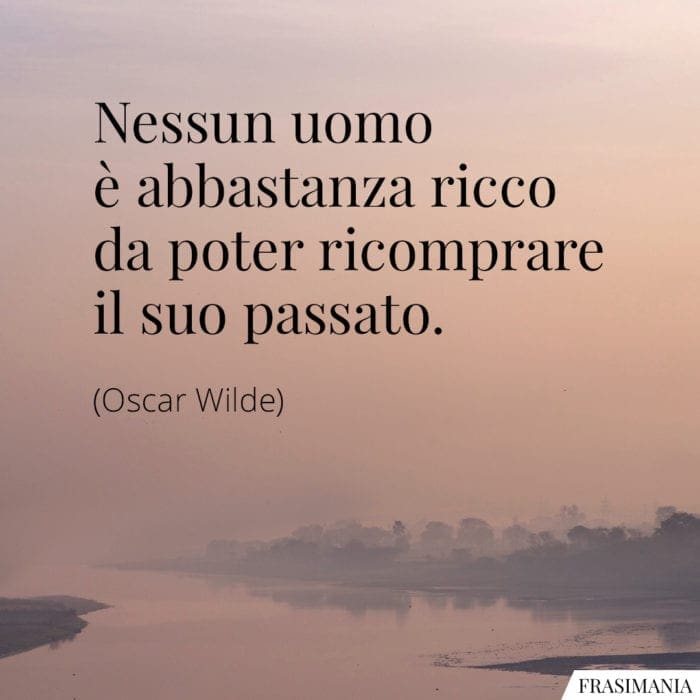
- The one charm of the past is that it is the past.
L’unica cosa affascinante del passato è che è passato.
(Oscar Wilde) - The past is behind, learn from it. the future is ahead, prepare for it. The present is here, live it.
Il passato è dietro, impara da esso. Il futuro è avanti, preparati. Il presente è qui, vivi.
(Anonimo) - Who controls the past controls the future. Who controls the present controls the past.
Chi controlla il passato controlla il futuro. Chi controlla il presente controlla il passato.
(George Orwell) 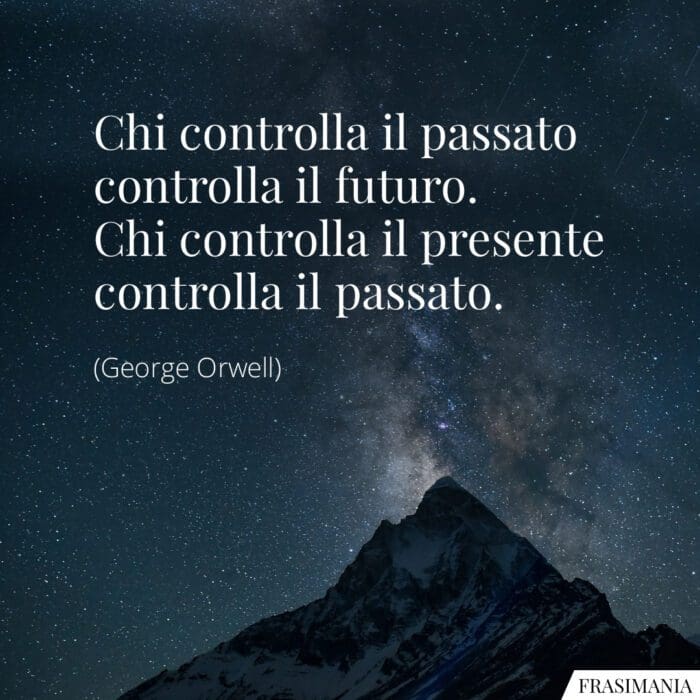
- Things without all remedy should be without regard: what’s done is done.
Le cose senza alcun rimedio dovrebbero essere senza riguardo: ciò che è fatto è fatto.
(William Shakespeare) - Just as a snake sheds its skin, we must shed our past over and over again.
Proprio come un serpente getta la sua pelle, dobbiamo gettar via il nostro passato più e più volte.
(Buddha) - It is by no means an irrational fancy that, in a future existence, we shall look upon what we think our present existence, as a dream.
Non è affatto una fantasia irrazionale che, in un’esistenza futura, considereremo ciò che pensiamo della nostra esistenza presente, come un sogno.
(Edgar Allan Poe) - Every time you are tempted to react in the same old way, ask if you want to be a prisoner of the past or a pioneer of the future.
Ogni volta che sei tentato di reagire nello stesso vecchio modo, chiediti se vuoi essere un prigioniero del passato o un pioniere del futuro.
(Deepak Chopra) 
- Each has his past shut in him like the leaves of a book known to him by heart and his friends can only read the title.
Ognuno ha il proprio passato chiuso dentro di sé come le pagine di un libro imparato a memoria e di cui gli amici possono solo leggere il titolo.
(Virginia Woolf) - I can’t go back to yesterday – because I was a different person then.
Non posso tornare a ieri perché ero una persona diversa allora.
(Lewis Carroll) - People like us, who believe in physics, know that the distinction between past, present, and future is only a stubbornly persistent illusion.
Le persone come noi, che credono nella fisica, sanno che la distinzione tra passato, presente e futuro è solo un’illusione ostinatamente persistente.
(Albert Einstein) - Don’t let your past determine your destiny.
Non lasciare che il tuo passato determini il tuo destino.
(Confucio) 
- People who say that yesterday was better than today are ultimately devaluing their own existence.
Le persone che affermano che ieri era meglio di oggi stanno svalutando la propria esistenza.
(Karl Lagerfeld) - When the past no longer illuminates the future, the spirit walks in darkness.
Quando il passato non illumina più il futuro, lo spirito cammina nell’oscurità.
(Alexis de Tocqueville) - The past cannot be changed, forgotten, edited or erased; it can only be accepted.
Il passato non può essere cambiato, dimenticato, modificato o cancellato; può essere accettato solo.
(Anonimo) - Gratitude looks to the past and love to the present; fear, avarice, lust, and ambition look ahead.
La gratitudine guarda al passato e ama il presente; paura, avarizia, lussuria e ambizione guardano avanti.
(C.S. Lewis) - Tomorrow’s truth grows out of yesterday’s error.
La verità di domani si nutre dell’errore di ieri.
(Antoine de Saint-Exupéry) 
- The past can hurt. But the way I see it, you can either run from it, or learn from it.
Il passato può fare male. Ma per come la vedo io, dal passato si può scappare, o imparare qualcosa.
(Walt Disney) - How can the past and future be, when the past no longer is, and the future is not yet? As for the present, if it were always present and never moved on to become the past, it would not be time, but eternity.
Come possono essere il passato e il futuro, quando il passato non è più e il futuro non è ancora? Per quanto riguarda il presente, se fosse sempre presente e non fosse mai passato, non sarebbe stato tempo, ma eternità.
(Agostino d’Ippona) - I desire no future that will break the ties of the past.
Non desidero un futuro che spezzerà i legami col passato.
(George Eliot) - No reflection was to be allowed now, not one glance was to be cast back; not even one forward. Not one thought was to be given either to the past or the future. The first was a page so heavenly sweet, so deadly sad, that to read one line of it would dissolve my courage and break down my energy. The last was an awful blank, something like then world when the deluge was gone by.
Ora non si poteva permettere alcuna riflessione, non si doveva guardare indietro; nemmeno in avanti. Non si doveva pensare solo al passato o al futuro. Il primo era una pagina così dolcemente celestiale, così mortalmente triste, che leggerne una riga avrebbe sciolto il mio coraggio e avrebbe distrutto la mia energia. L’altro era un brutto vuoto, qualcosa come il mondo dopo il passaggio del diluvio.
(Charlotte Brontë) - Were I to live my life over again, I should live it just as I have done. I neither complain of the past, nor do I fear the future.
Se dovessi rivivere la mia vita, la vivrei esattamente come come ho fatto. Non mi lamento del passato, né temo il futuro.
(Michel de Montaigne) 
- The past cannot be changed. The future is yet in your power.
Il passato non può essere cambiato, ma il futuro è nelle tue mani.
(Mary Pickford) - Man who lives in three places – in the past, in the present, and in the future – can be unhappy if one of these three is worthless. Religion has even added a fourth – eternity.
L’uomo che vive in tre luoghi – nel passato, nel presente e nel futuro – può essere infelice se uno di questi tre non ha valore. La religione ne ha persino aggiunto un quarto – l’eternità.
(Georg Christoph Lichtenberg) - Let your past make you better, not bitter.
Lascia che il tuo passato ti renda migliore, non amaro.
(Anonimo) - History is the version of past events that people have decided to agree upon.
La storia è la versione degli eventi passati che le persone hanno deciso di concordare.
(Napoleone Bonaparte) - Children have neither past nor future; they enjoy the present, which very few of us do.
I bambini non hanno né passato né futuro; si godono il presente, cosa che pochissimi di noi fanno.
(Jean de La Bruyère) 
- The past attracts me, the present frightens me, because the future is death.
Il passato mi attrae, il presente mi spaventa, perché il futuro è la morte.
(Guy de Maupassant) - If you are still talking about what you did yesterday, you haven’t done much today.
Se stai ancora parlando di quello che hai fatto ieri, oggi non hai fatto molto.
(Anonimo) - Don’t let yesterday take up too much of today.
Non lasciare che il passato occupi troppo spazio nel presente.
(Will Rogers) - Shall we never never get rid of this past? It lies upon the present like a giant’s dead body.
Ci libereremo mai di questo passato? Esso si trova nel presente come il corpo morto di un gigante.
(Nathaniel Hawthorne) - One’s past is what one is. It is the only way by which people should be judged.
Il nostro essere è il nostro passato. E solamente col passato è possibile giudicare le persone.
(Oscar Wilde) - Learn from yesterday, live for today, hope for tomorrow.
Impara dal passato, vivi nel presente, spera nel futuro.
(Albert Einstein) 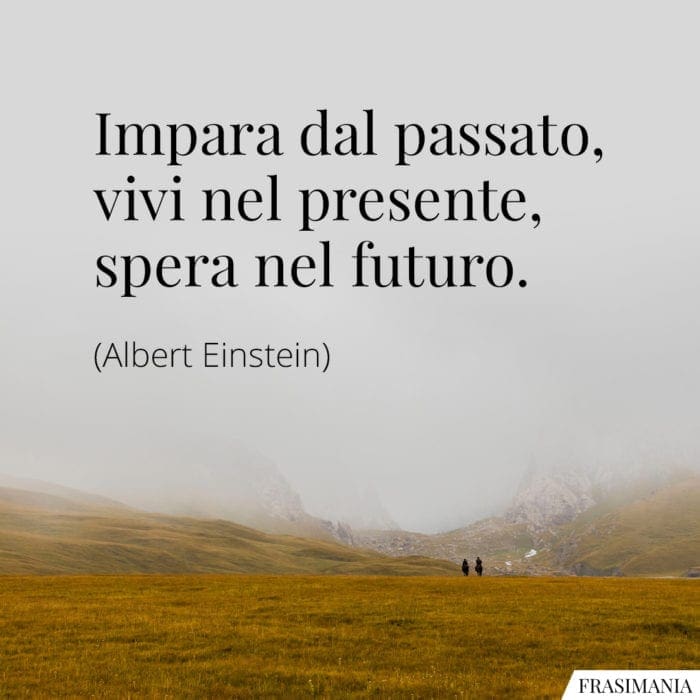
- Strange, what brings these past things so vividly back to us, sometimes.
Strano, cosa riporta in modo così vivido il passato, a volte.
(Harriet Beecher Stowe) - If you want to understand today, you have to search yesterday.
Se vuoi capire oggi, dovevi cercare ieri.
(Pearl Buck) - The past cannot be changed. The future is yet in your power.
Il passato non può essere cambiato. Il futuro è ancora in tuo potere.
(Anonimo) - If we open a quarrel between past and present, we shall find that we have lost the future.
Se apriamo una disputa tra passato e presente, scopriremo che abbiamo perso il futuro.
(Winston Churchill) - Yesterday is gone. Tomorrow has not yet come. We have only today. Let us begin.
Ieri è passato. Domani non è ancora arrivato. Abbiamo solo oggi: cominciamo.
(Madre Teresa di Calcutta) 
- Do not dwell in the past, do not dream of the future, concentrate the mind on the present moment.
Non fermarti nel passato, non sognare il futuro, focalizza il pensiero sul momento presente.
(Buddha) - We are made wise not by the recollection of our past, but by the responsibility for our future.
Siamo resi saggi non dal ricordo del nostro passato, ma dalla responsabilità per il nostro futuro.
(George Bernard Shaw) - The past is a good place to visit, but I wouldn’t want to live there.
Il passato è un buon posto da visitare, ma non vorrei viverci.
(Anonimo) - No one should be entirely judged by their past.
Nessuno dovrebbe essere giudicato solo per il suo passato.
(Oscar Wilde) - I can only note that the past is beautiful because one never realises an emotion at the time. It expands later, and thus we don’t have complete emotions about the present, only about the past.
Posso solo notare che il passato è bello perché non si realizza mai un’emozione in quel momento. Si espande successivamente, e quindi non abbiamo emozioni complete nel presente, ma solo nel passato.
(Virginia Woolf) - Never let the sadness of your past and the fear of the future ruin the happiness of your present.
Non lasciare mai che la tristezza del tuo passato e la paura del futuro rovinino la felicità del tuo presente.
(Anonimo)






